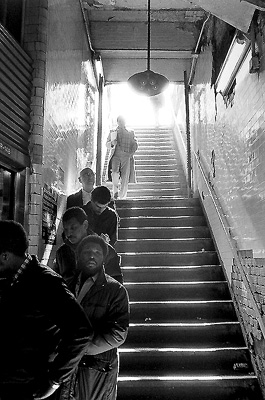Disabused
J has lost all interest in whatever he sees, hears, talks, does or feels. Snow flakes sing in chorus and whirl in the wind indefinitely. J understands he is destined to be mediocre. He will not be too rich, but not poor enough to break the law. He is not too happy, but not so unhappy to hurt himself. He is tired of himself. J has bought a CD entitled 'Seen it through and leave.' Its cover picture shows a family car parked outside a tightly shut cottage house. A rubber tube has one end mounted on the car's fume pipe and the other end dipped through a small crack into the house. This CD, if brought to J five years ago, would have thrilled him. Now he leaves it aside. J is misanthropic. Now he believes vanity is the prime force of the animal world, and jealousy its reaction, governed by a law analogous to Newton's third law of physics, that for every action, there is an equal and opposite reaction.
In the dying city where J lives, euthanasia has been blown up as an issue on newspapers recently. J wonders why not. Many suicides occur each day in this city. Many of which are in fact committed for no reason. The victims simply had their minds blanked-out. They died because they did not carry on living. It is not even an positive act or choice, it is simply a battery running out or a candle extinguished by an air rush. Journalists know their readers dislike inexplicable deaths. Therefore they attribute them to loan recall, work pressure, bitter love triangle, fear of guilt, physical torment or, if none of the above can be squeezed to fit, mental illness, which is closer to truth and therefore less appealing. Loneliness, which may be the closest to truth, is almost never mentioned. The readers forbid this unimaginative explanation. Philosophical suicide is a drag. That something can occur without a cause is an irritating affront to common sense.

Everybody in this city holds his head down in the street, as if his shoes have hypnotised him or a 10 kg dumbbell is weighing on his neck. Ending one's own life because of loans or hurtful love or out of spite is after all an event. However, ending it for indifference is not. To kill is an action; to cease living is an omission.
J is uncompromisingly silent in his declining social life. He has almost stopped talking to himself as he is sick of himself. At school he has learnt that friendship is a mirror that helps us to understanding ourselves. Yeah, so true, he cannot agree more. He has acquired the habit of always being the first to leave social parties. He has also learnt that he should take people's ill will as granted. 'I am not welcomed' and 'I am disliked' have been proved very sound working assumptions. J does not believe in miracles any more. Nor in metamorphosis of person. In cocktail parties, J is able to sip a glass of spirit quietly in the middle of the hall. He is no longer ashamed of loneliness. This is worrying J slightly, yet he is comforted when he considers that it is unsettling the other guests to an even greater extent. J does not reach out to chat with the strangers and he despises those who come up to chat with him, as he considers them as unpleasant as himself and worse for they have yielded to the norm.
Resignation is in vogue. Spring is universally associated with hope, but not so in this city. '15 years ago, and last year,' J thought. Why do people speak less and less? 'Because everybody is getting older. We have nothing to look forward to. And there is nothing indispensible.' J still thinks Bohemian Rhapsody is the best song. 'Is it bad taste and cowardice in staying alive?' J asked himself.
It is a Supermen's universe where confirmed losers have no place. Players that have been knocked out of the tournament are asked to retire to the spectators' stand. Bow out decently? Sportsmanship? Shame on you. All best things are already behind him. A loser should not be humiliated further. There should be a more dignified way. It should not be such a disgrace.

It is a windy wintry night. J presses his face against the window pane of an up-class Italian restaurant which he visited once upon a time. In the middle of the room two carefully dressed couples, may be bankers meeting lawyers, are clinking their crystal chalices. J hears clinks in his ears but he is not sure if the clinks really reached his ears or they were conjured up by his brain cells. Further into the room, along a wall by the fireplace, a man and a woman are rising from their chairs. The man is not handsome. He may be aware of this and therefore has tried to make good by wearing a shirt, suit and tie which he considers the smartest and trendiest. Has he been less concious of his tie and shirt, his neck, armpits, elbows and wrists could have moved more smoothly. His shirt comes with French cuffs and possibly platinum links. The shirt is checked. The tie comes with bright stripes which are narrower than the checks. Now he is walking ahead of his blissful and voluptuous lover to the door. He swings the door outward. He steps out. Two of his right hand fingers keeps the door open. The woman is drifting towards into the channel between his huge back and the door frame like a willow leaf rushes through a narrow part of a brook. Just before his fingers snap, in a hundredth of a second, she swerves her head, ups her chin, lifts her newly bought designer handbag to her stomach and throws askance at a quiet young casually-dressed damsel sitting at a table with three grey-haired men ('probably a daughter of a university professor or senior bureaucrat'--she thought) a slightly spiteful but overwhelmingly self-contented look, so carried away by her own charm that she mistakes the damsel's uneasiness at their want in manner for a jealousy-induced contempt.
Sam Mok
moksheungming@yahoo.com
2004.5.14